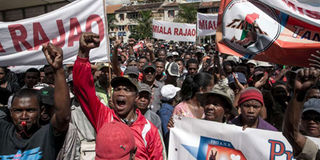SADC countries in turmoil as Madagascar is hit by protests

Supporters of Madagascar opposition demonstrate on a fifth straight day of anti-government protests on April 25, 2018 in Antananarivo, calling for the president to step down. PHOTO | RIJASOLO | AFP
What you need to know:
- Burundians are set for a referendum slated for May 17 aimed at deciding whether President Pierre Nkurunziza should run for a disputed third term.
- Kabila has not announced whether he will be seeking a new term, and his silence has further fuelled tension, serious violence and instability.
With the presidential election not due until November or December, Madagascar is already in the political doldrums once again as tensions mount in the aftermath of recent clashes.
Protests flared up on Saturday last week when demonstrators from the opposition attended a march after President Hery Rajaonarimampianina denounced what he referred to as an attempted coup.
The president was elected in 2013 but has not yet announced whether he will stand for re-election in the large Indian Ocean island, which has been beset by decades of political instability.
Two former heads of state – Marc Ravalomanana and popular DJ Andry Rajoelina – are reportedly planning to run for the top post.
POLITICAL CRISES
While Ravalomanana was the volatile country’s president from 2002 to 2009, Rajoelina deposed him from power during a coup, but both of them were barred from running in 2013.
Tellingly, though, their respective political parties were involved in the political protests even as tension escalated in other Southern African Development Community (SADC) countries.
These include Lesotho, Burundi and DR Congo, all of which have gone through their own prolonged political crises.
Burundians are set for a referendum slated for May 17 aimed at deciding whether President Pierre Nkurunziza should run for a disputed third term, an almost forgone conclusion.
As for DR Congo’s President Joseph Kabila, he is still clinging onto power with no clear signs of when the long-awaited presidential elections will be held.
JOSEPH KABILA
Having been in office for 17 years, his holding onto the presidency is despite the fact that he was supposed to step down in November 2016, having completed his constitutionally mandated two terms.
Clearly having overstayed his welcome, President Kabila has provoked several deadly protests, even as the country’s electoral commission announced last year that elections would be held on December 23 this year.
Typically, Kabila has not announced whether he will be seeking a new term, and his silence has further fuelled tension, serious violence and instability.
With his refusal to hold elections expected in 2016 prompting numerous protests, DR Congo has together with Lesotho and Madagascar for some time been viewed as potential tinderboxes.
OPPRESSION
Not surprisingly, in December last year, the United Nations Security Council noted that “political tensions have been exacerbated by the DRC government’s curbing of political freedoms of the opposition”.
The body added that DR Congo’s leaders had also been curtailing the freedom of the press, even as scores of anti-government protesters had been killed during demonstrations.
Regarding Burundi, since early 2015 the country has experienced political instability marked by violent clashes between government and opposition forces.
Further, the country has experienced the suppression of civil society, media and groups opposed to President Nkurunziza’s decision to seek a third term in office.
ELECTORAL LAWS
Gratefully though, in December last year a new round of talks led by the East African Community was initiated in Arusha, Tanzania, with the aim of ending the protracted Burundian crisis.
Back to Madagascar, according to media reports two people were killed and at least 16 others wounded following a crackdown by security forces on demonstrators in the capital Antananarivo.
The demonstrators have been protesting against new electoral laws that the opposition claim could bar some candidates from standing in the coming presidential election.




